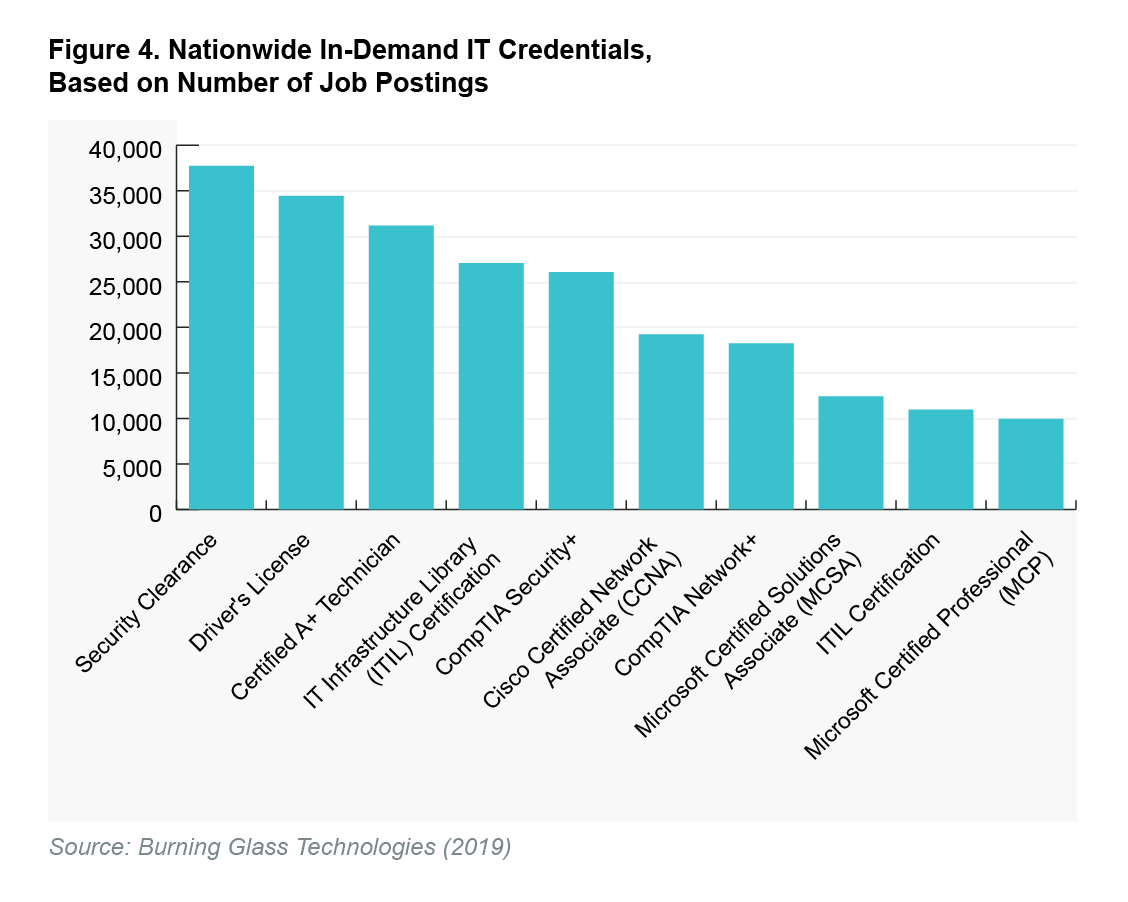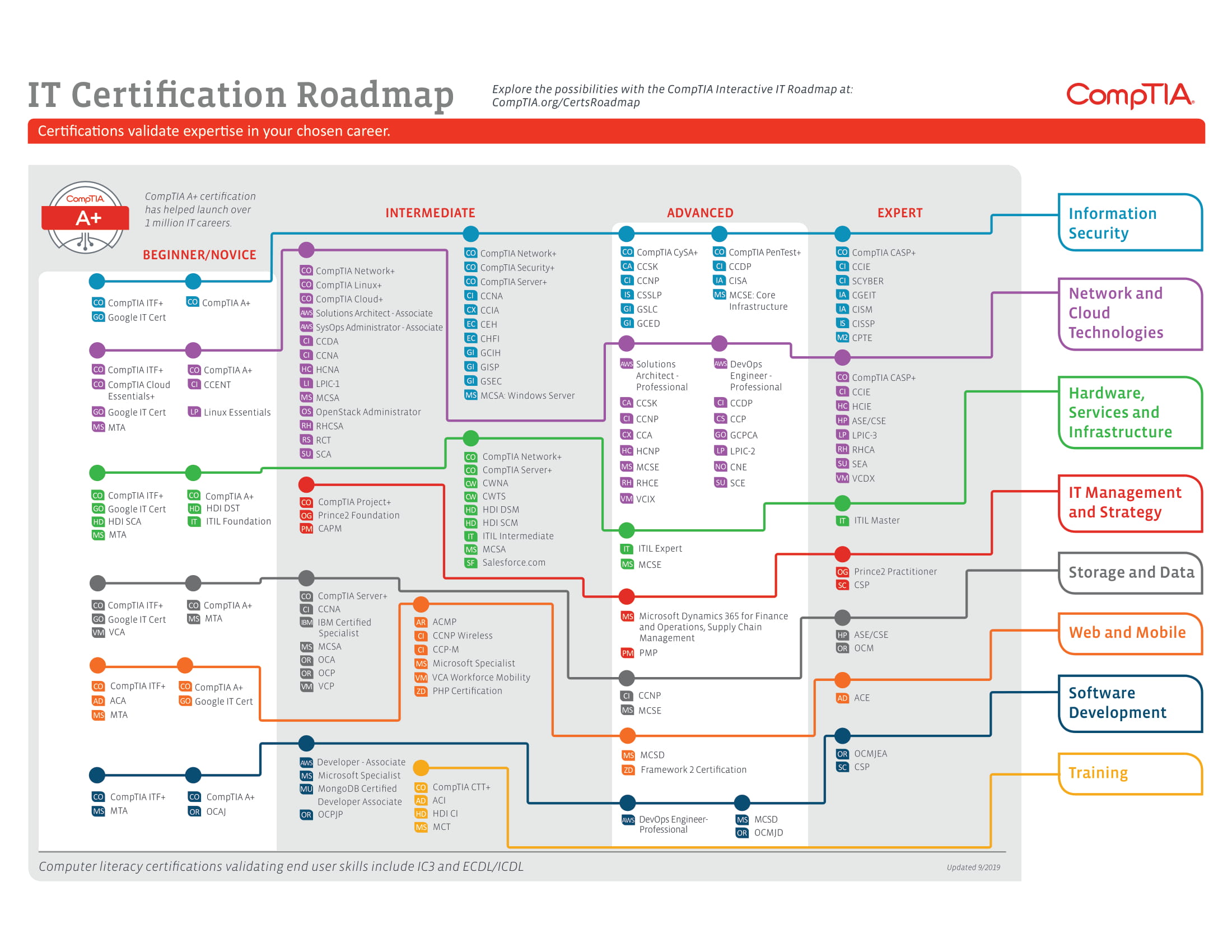July 23, 2020
This is the third component of the Framework for a High-Quality IT Pre-Apprenticeship Program from JFF’s Center for Apprenticeship & Work-Based Learning.
The IT sector has a robust credentialing ecosystem, and IT pre-apprenticeship programs and other entry-level IT job training programs commonly offer a suite of industry-recognized credentials. Many training programs provide participants with the option to earn two to three credentials, and that often drives much of the curriculum design. However, it is unclear whether this enthusiasm for credentials is matched by employers. Demand for industry-recognized credentials is currently mixed, with only about one-third of IT job postings requesting specific credentials. Leading Registered Apprenticeship programs also do not tend to require credentials beyond a high school diploma. Regardless of whether credentials are required to enter the field, IT employers often upskill their workers with industry-recognized credentials.
This data is based off of a 12-month nationwide analysis of IT roles from Burning Glass Technologies. The data was extracted by JFF’s Sara Lamback in August 2019.
The best IT pre-apprenticeship programs facilitate earning credentials that support direct entry into the workforce, are aligned with labor-market demand, and are validated by regional and/or national employers or industry associations.
Many IT credentials that are recognized by the industry can be incorporated into a pre-apprenticeship program, with the CompTIA A+ certification and a security clearance having the most value to IT employers.
In IT, industry associations and software/hardware vendors (e.g., Cisco, Microsoft) are key creators and validators of credentials. The CompTIA A+ certification is the most widely recognized and requested entry-level credential in the sector, and helps individuals build baseline skills and knowledge that are applicable across a wide range of career pathways in the sector, from IT support to programming.

The ability to obtain a security clearance is the most sought-after IT credential and surprisingly important in roles across the sector, though it is particularly valued in cybersecurity. If possible, providing pre-apprentices with a security clearance could make them stand out in the labor market. Once security clearances are issued, there is a process for transferring them to a new employer, which pre-apprentices could pursue when entering a new job or moving on to an apprenticeship program.
Credentials aligned with specific pathways within IT include the following:
- IT Support and Service: The CompTIA A+ certification is requested widely for entry-level IT support roles, with the CompTIA Network+ and CompTIA Security+ certifications also cited.
- Cybersecurity: Cyber-focused job postings typically place greater emphasis on the ability to obtain a security clearance and may also include the CompTIA Security+ and/or Certified Information Systems Security Professional (CISSP) credentials.
- Programming: Credentials are requested less frequently for programming roles, though the IT Infrastructure Library (ITIL) certification, Project Management certification, and CompTIA’s Security+ certification are a few that are sought after by some employers.
IT pre-apprenticeship programs should facilitate earning credentials that are stackable and portable.
The CompTIA A+ certification provides a foundational certification that is designed to stack with a wide range of other IT credentials.
Many IT employers are hesitant to commit to long-term training because of the field’s quickly changing skills needs. Stackable credentials provide an effective way to support advancement within the sector by demonstrating growing skill and competency gains to employers. Often, the CompTIA A+ certification is the first credential in a series. However, some programs are looking for a more baseline credential. The relatively new Google IT Support Professional Certificate and the CompTIA IT Fundamentals certification are aligned with the CompTIA A+ certification, and can be offered as an on-ramp to the CompTIA A+ content within a pre-apprenticeship program.

When seeking to provide more targeted credentials, pre-apprenticeship programs should look to offer certifications, such as the Microsoft Certified Solutions or the Cisco Certified Network Associate certifications, that are tied to a specific vendor or platform. Because these vendors drive many credentials across the industry, they are simultaneously recognized as the industry standard and are therefore portable.
IT pre-apprenticeship programs should facilitate earning credentials that prepare participants or align with the skills identified for training and the curriculum.
IT pre-apprenticeship programs can be built around the CompTIA A+ certification to teach baseline skills, while the more specialized technical skills may or may not align with a credential.
As described above, many IT programs are built around the CompTIA A+ certification because of its foundational relevance across a range of pathways in the IT field, from networking to cybersecurity and programming. While many IT on-ramp training programs lead to multiple credentials, high-quality pre-apprenticeship programs should focus on in-demand skills as their top priority, and then only support the attainment of industry-recognized credentials that align with those skills. In the current market, employers ask for credentials less often than IT training programs provide them, which means that a credential focus can distract from the potential value of the curriculum.
IT pre-apprenticeship programs should embed preparation for earning industry-recognized credentials into the curriculum, including supports such as test delivery.
Because many IT job candidates earn multiple industry-recognized credentials, certification costs add up and should be covered by the pre-apprenticeship program whenever possible.
High-quality pre-apprenticeship programs should not only prepare participants to earn industry-recognized credentials, but should also include supports to facilitate obtaining the credential itself.
Pre-apprenticeship programs should support instructor training and certification to help ensure that instructors have mastered relevant content and are able to deliver it effectively to training participants. In some cases, an instructor must be certified by a validating agency. For example, CompTIA A+ instructors have to be CompTIA A+ certified in order to teach the course. In these cases, high-quality pre-apprenticeships should provide supports to instructors for such certification.
Pre-apprenticeship programs are also particularly helpful to participants when they defray the costs associated with examinations, which can be significant. The cost of obtaining industry-recognized credentials can surpass $1,000 when multiple credentials are required, or candidates don’t pass an examination on the first try. As a baseline credential, CompTIA A+ certification costs $340 ($170 for each exam). Other common credentials range from $260 for Linux+ to $339 for CompTIA Security+, to as high as $700 for the CISSP. Educational vouchers and discounted rates for many of these certifications are available to training providers. Pre-apprenticeships should contact vendors directly to explore their options.